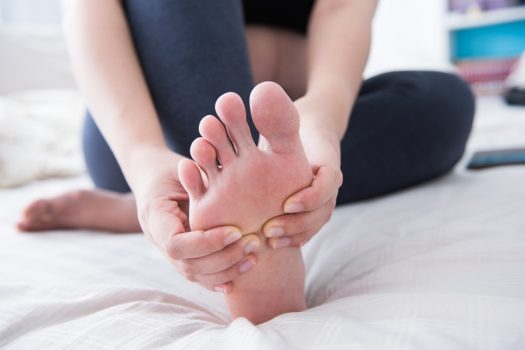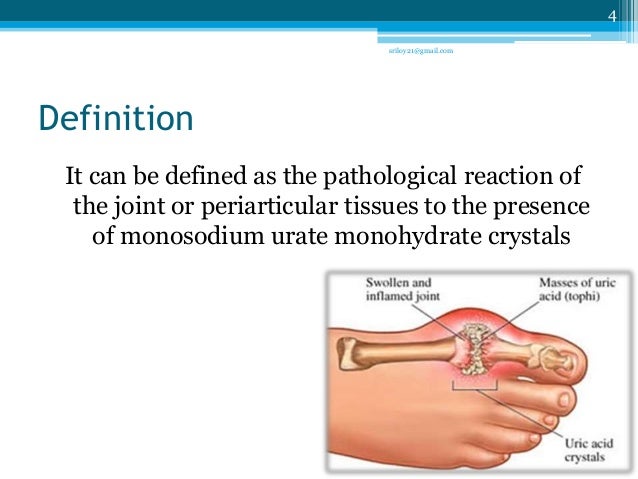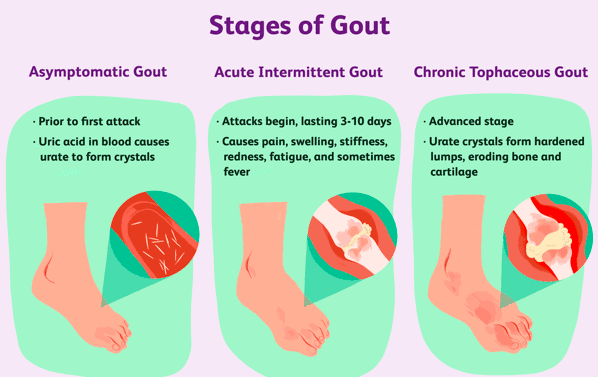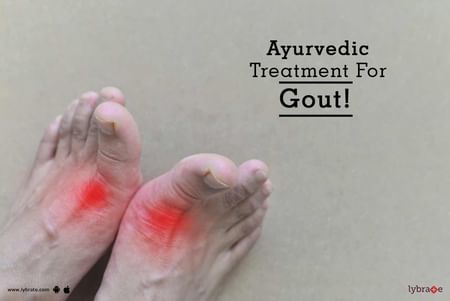108 Glen Osmond Road, Parkside

Gout is a metabolic disease characterized by painful inflammation of certain joints, especially of the big toe and foot, caused by deposits of sodium urate in them. It is also known as gouty arthritis. While most other types of arthritis develop slowly, an attack of gout usually happens suddenly, often overnight.

Â
Symptoms of Gout :
The symptoms of gout tend to be progressive and will worsen over time if left untreated. The severity and recurrence of symptoms are largely related to the stage of the disease.
Â

Asymptomatic gout is the period before your first attack. It is during this time that the persistent elevation of uric acid in your blood will cause urate to form crystals. While you will not experience any symptoms at this stage, the gradual accumulation of crystals will almost inevitably lead to an attack.
Acute intermittent gout is the stage when you will start to experience attacks lasting anywhere from three to 10 days. The attacks (most commonly affecting the big toe but also the knee, ankle, heel, midfoot, elbow, wrist, and fingers) will cause sudden and extreme pain accompanied by swelling, stiffness, redness, fatigue, and occasionally mild fever.
Chronic tophaceous gout is an advanced stage of the disease in which the urate crystals consolidate into hardened lumps called tophi. The formation of these mineralized masses can progressively erode bone and cartilage tissue and lead to chronic arthritis and joint deformity.
Complications of untreated gout include kidney stones and the deterioration of kidney function.
Causes of Gout :
Gout occurs when uric acid, a normal waste product, builds up in your bloodstream and forms urate crystals in a joint. Your body makes uric acid when it breaks down purines, a substance found in your body and in some foods. Uric acid normally dissolves in your blood, is processed by your kidneys, and leaves your body in urine. If your body makes too much uric acid, or your kidneys can’t clear enough of it out, it builds up in your blood. This is called hyperuricemia. Having hyperuricemia doesn’t mean you’ll develop gout; most people with hyperuricemia don’t go on to develop gout. Because of this, it’s thought that other factors, such as your genes, may be involved.Â
Similar attacks to gout can be caused by a condition called pseudogout (or acute calcium pyrophosphate arthritis). In this case, crystals of calcium (rather than urate) are deposited in joint cartilage and then shed into the joint space. This is likely to affect your knees and other joints more than the big toe and is most common in people with osteoarthritis.
 You’re more likely to have a gout attack if you:
Ayurvedic view of Gout :

Â
The Sanskrit name for gout is Vata Rakta, which means Vata (wind) in the blood. Accordingly to that understanding, gout is treated by reducing Vata and cleansing the blood.
Texts of Ayurveda explain the causes of gout as follows:Â
•Increased consumption of salty, sour, spicy, and fried foods
•Consumption of red meat, sea in excess.
•Indigestion.
•Consuming opposite foods.
•Stress, anger, anxiety.
•Sleeping during the daytime and staying awake at night.
•Excessive intake of alcohol.
•Injury
•Accumulation of toxins in the body.
•Suppression of natural urges
•Working in extreme climatic conditions.
The above facts vitiate both blood and vayu simultaneously and cause gout.

Ayurvedic Herbal Treatment of Gout / Vatarakta :
Ayurvedic treatment of gout focuses on clearing high levels of uric acid from the blood, dissolving the deposited uric acid crystals, and relieving the pain, swelling, and inflammation.Â
In terms of treatment, the first choice is for treatment via an alteration of the dietary regimen. Low-oxalate and low-uric acid-forming foods and a low-meat diet are to be encouraged. High fiber, low protein foods should be emphasized; old rice (but not fresh rice), wheat, moong dal, garlic, onion, bitter gourd, papaya, and green banana are beneficial. Sour and salty tasting foods and heavy and fried foods are to be avoided. Rhubarb is a specific food remedy for gout, as are sweet cherries and their juice. It is critical in the treatment of Gout that the patient is kept well hydrated.
Â
Herbal medicines specifics for the treatment of gout include Lashun (Garlic), Guggul (Commiphora mukul), and Shallaki (Boswellia serrata), as well as Guduchi (Tinospora cordifolia), the last of which is applied in all conditions of aggravated ranjaka pitta and pitta in the blood. The compound of Sunthi (Ginger), Kumari (Aloe vera), and Guduchi is a specific and especially effective formulation commonly used in treating gout.
Ginger: Ginger has anti-inflammatory, anti-ulcer, and antioxidant activities, as well as a small amount of analgesic properties. It also improves digestion and helps to avoid Ama toxins in the body, which can trigger autoimmune and inflammatory diseases.
Garlic: Eating garlic is safe for gout sufferers. Garlic is helpful against inflammation and is not known to have high amounts of purines, meaning you can eat it in moderate amounts. Garlic has powerful antioxidants and sulfur compounds that help reduce inflammation and protect your cells against aging, oxidative stress, and damage. Allicin is an organosulfur compound found in garlic. Many preclinical studies have found that organosulfur compounds from garlic could have anti-inflammatory properties.
Ashwagandha:Â Ashwagandha is popularly known as Indian ginseng in the West. It has known anti-inflammatory, anti-cancer, and anti-stress activities. The plant steroids exert anti-inflammatory action, whereas another active ingredient of this herb root is Withaferin, which acts as a potent stress buster.
Guggul:Â Many kinds of guggul are combined, and several medicines are made from it. In Ayurveda, it is considered a painkiller as it reduces pain and inflammation around the joints and helps in controlling uric acid.
Diet recommendations in Gout / Vatarakta :
A vegan diet is considered beneficial in Ayurveda for the treatment of gout.
Celery is one of the most beneficial items that help in the treatment of gout. Celery helps in reducing the acidic content of the body, thereby getting rid of conditions that are favorable for gout.
One should avoid foods that are high in purines. Purines break down into uric acid in the body, and an excess of uric acid in the body is the leading reason for gout. High-protein foods are rich sources of purines. These include meats, yeast, and mussels.
One should avoid dairy products such as milk and instead switch to rice or soy milk.
Vegetables should be included in the diet, and meat and meaty products should be avoided.
Processed foods such as white bread should not be eaten as they further upset the imbalance already present in the body.
Fresh fruits, nuts, and berries such as strawberries, blueberries, and cherries should be introduced to the ayurvedic diet that is being undertaken for the treatment of gout.
One should avoid hot and spicy foods so that the body does not heat up. Also, seafoods including shellfish, prawns, crabs, and sardines should not be eaten.
Alcohol and smoking must be completely avoided if one wants relief from gout by embarking on an ayurvedic diet.
We at Life Line Ayurvedic Herbal Clinic make use of rejuvenating herbs, restorative herbs, anti-Vata herbs for anti-inflammatory, natural pain relief, and anti-degenerative herbs to check the progression of disease, to relieve symptoms, to improve joint structure, and to improve flexibility and movement. We pay special attention to balancing your metabolism, detox, and cleansing as a short to long-term treatment and prevention option with special herbs that you can take for a long duration without any side effects. Along with Ayurvedic herbs, external Ayurvedic Panchakarma therapy procedures like simple massage, Patrapottali, and Churnapottali are also helpful in relieving problems like pain and redness, and in improving flexibility. The overall emphasis is to relieve the symptoms naturally, without side effects. Then, all efforts are made to keep the uric acid level under control so that you have less chance of repeat attacks. You can expect fast relief, naturally. We make good use of non-herbal dietary and lifestyle measures to ensure that you stay healthier, with as few herbs as possible. You can use our Ayurvedic Treatment for Gout along with your current medical treatment and drugs.
For further advice and treatment options, please contact expert Ayurvedic doctors at Life Line Ayurvedic Herbal Clinic as soon as possible.
Â
Disclaimer : Sandeep Kumar and Anupam Vasudeva are not GP, they have Ayurveda medical degree from India where it is considered equal to any other medical degree. This qualification is recognized in Australia by vetassess governing body as Complementary Health Therapists. Life Line Ayurvedic Herbal Clinic does not claim to cure a disease or terminal illness and does not create any unreasonable expectation of beneficial treatment. Ayurvedic medicines and treatments are generally considered to be safe but rarely may be associated with possible adverse reactions in individual cases. We recommend seeking urgent medical attention in the case of an adverse reaction. This website provides you with information. You must contact your Ayurvedic or another health professional before you apply them. Read More